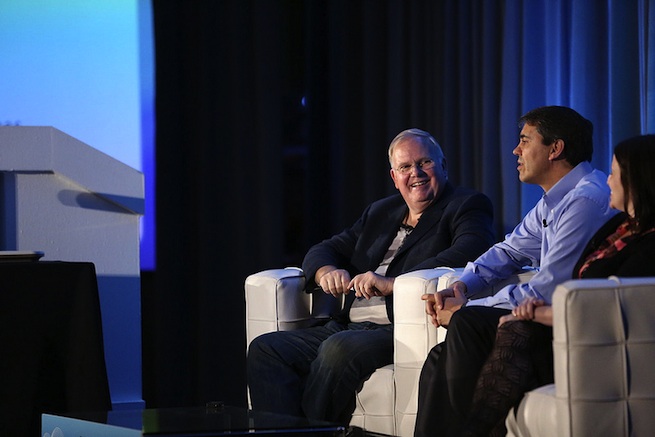“Big data” is all the rage, but it’s rare you’ll hear real case studies from companies that are storing, processing, and analyzing vast stores of unstructured data (texts, emails, reports, and so on).
[aditude-amp id="flyingcarpet" targeting='{"env":"staging","page_type":"article","post_id":581189,"post_type":"story","post_chan":"none","tags":null,"ai":false,"category":"none","all_categories":"big-data,business,cloud,enterprise,","session":"B"}']At CloudBeat, a conference that focuses on innovative cloud-based technologies, companies revealed on stage how they are using NoSQL databases to drive their business strategy. The session was moderated by Bill Coughran, Partner at Sequoia Capital and former senior vice president of engineering at Google.
On stage, Coughran said he had spoken with dozens of companies that had collected unstructured data but had no idea about what to do once it was stored.
AI Weekly
The must-read newsletter for AI and Big Data industry written by Khari Johnson, Kyle Wiggers, and Seth Colaner.
Included with VentureBeat Insider and VentureBeat VIP memberships.
For companies, data-mining is a highly complex and regulated process. “Consumer data is a very sensitive topic,” said Hope Arenas, group manager of e-business development at Bosch Tool Corporation, a company that provides power tools. “To try to do something that is revolutionizing our marketing [strategy]…there was no other way we could have got anything approved unless it was cloud-based.”
Arenas described how the company selected AgilOne‘s analytics tools to help standardize and collect data. “What wasn’t easy was getting everyone on the same page and getting it clean and processed,” Arenas explained. “We are just starting to analyze the data.”
For Arenas, big data means being able to connect with potential customers, start conversations with retailers, and target existing customers with marketing messages.
The company discovered that people who own its power tools typically have at least two to four of them. The marketing team began incorporating localization into their emails. By understanding where their customers are based, Bosch could share offers from its nearest service center.
Daniel Rapp, Vice President of Research, UX, and Web Development of Family Search joined Arenas on stage to discuss how the company uses big data technologies to determine whether strangers are related.
The company can process data about family history — if two people are related, the data will pinpoint where their family trees intersect.
[aditude-amp id="medium1" targeting='{"env":"staging","page_type":"article","post_id":581189,"post_type":"story","post_chan":"none","tags":null,"ai":false,"category":"none","all_categories":"big-data,business,cloud,enterprise,","session":"B"}']
The key takeaway from the big data panel: The space is flooded with options, but we’re still in the nascent stages of understanding how companies can use their data to drive business and strategy.
In case you missed it, check out the full video here:
Photo credit: Michael O’Donnell
[aditude-amp id="medium2" targeting='{"env":"staging","page_type":"article","post_id":581189,"post_type":"story","post_chan":"none","tags":null,"ai":false,"category":"none","all_categories":"big-data,business,cloud,enterprise,","session":"B"}']
VentureBeat's mission is to be a digital town square for technical decision-makers to gain knowledge about transformative enterprise technology and transact. Learn More

